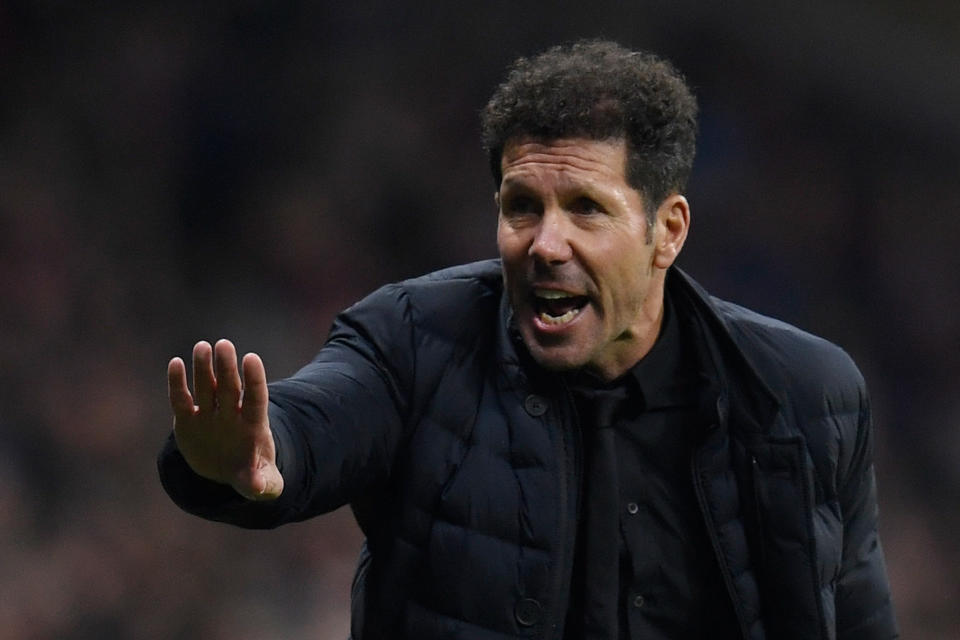Diego Simeone avoids becoming victim of own Atletico success, for now

Diego Simeone needed this win.
And it’s an astounding realization that “El Cholo,” so nicknamed, urgently required Saturday’s 1-0 victory over Granada on a 6th-minute Ángel Correa goal to lessen the swelling pressure on his position as Atletico Madrid manager. Because Simeone is Atletico. He is both its architect and its builder, the foreman and the bricklayer, the engine and the fuel.
Since the club’s former midfield enforcer returned as manager in 2011 — his third coaching appointment in that calendar year, curiously — he has led the club to two of the four European trophies it has won in its entire history and taken it to two of its three appearances in the Champions League final. He claimed the club’s sole La Liga title in the 21st century and only its second since the mid-1970s, doing it in an age of staggering economic dominance of the Spanish league by Real Madrid and FC Barcelona.
Most of all, he oversaw the return to relevance of a club that was closer to its last relegation than to its most recent title challenge. Before Simeone, Atletico hadn’t cracked the top three in a decade and a half. The Mattressmakers have not finished outside of the top three in any of his full seasons in charge. And in the process, he restored calm and process and protocol to a club that was a whirl of chaos and dysfunction even in the best of times — a club that had five different managers alone in 1988 and five more each in 1990 and 1994.
Simeone’s Atletico built a new stadium, demolishing the beloved but decrepit Vicente Calderon for the shiny, money-spinning Wanda Metropolitano — named for a Chinese sponsor, as befits a modern mega-club. After decades of flirting with insolvency under the shoddy management of a series of shady figures — lowlighted by the corrupt, racist, xenophobic, homophobic, Francisco Franco-sympathizing Jesus Gil y Gil — the club thrives, capable of spending as much on players as anyone. And Simeone has been linked to every major job in soccer, just about, but has remained loyal to the club the Argentine twice represented as a player. It probably helps that he’s reportedly the highest-paid manager in the game, earning some $48 million annually, twice the wages of the runner-up, Pep Guardiola.
But by Saturday, there was a feeling that if a sixth-placed Atletico — just three points out of fourth and its attendant Champions League berth — didn’t beat 10th-placed Granada, pressing questions would be asked about Simeone’s continued fitness for the job.
Going into the game, Atletico hadn’t won in three — losses to Eibar and, painfully, Real, and a tie with Leganes. That followed a run from early September to early December when Atletico won just three of 13 league matches. And that’s to say nothing of the shock Copa del Rey exit to third-tier Cultural Leonesa a few weeks ago.
Simeone, the energetic, black-clad provocateur, made an appeal to his players’ pride. “I just think about improving and getting out of this dynamic, which isn't so good,” he told the Spanish press. “We have to show that we are alive."
And the club, for now, has given him the dreaded vote of confidence. “In the last decade we have competed in many finals, we have won nine trophies and consolidated ourselves among the greatest teams in Europe,” said chief executive Miguel Angel Gil Marin after the stunning Copa del Rey elimination. “The quality and commitment of the squad and coaching staff, led by Diego, cannot be questioned and I have no doubt they will achieve the club's objectives this season and help us grow over the next few years.”
Simeone is a victim of his own success. The win lifted Atletico back in fourth place, although Sevilla could reclaim it on Sunday. A fourth-placed finish would constitute an excellent season before his time at the club. But the trouble with being an excellent manager is that the demand for excellence never abates.
Never mind that he hasn’t had a fit or effective striker at his disposal for some time, with Diego Costa endlessly injured and Alvaro Morata now out of action too — exacerbating the goal-scoring problem, his side producing a mere goal per game in the league. Never mind that Atletico is rebuilding, shipping out a half-dozen starters and some of its best players over the summer, and expensively replacing them. Shaping a new squad, especially in Simeone’s rigid and tightly orchestrated counterattacking system, takes time. A year at least. But after decades in the wilderness, there is no patience for a single subpar season any longer now that the club matters again. Questions over Simeone’s effectiveness persist as his once-unshakable popularity with the fans seems to ebb.
In a great irony, the man rumored to be in line to replace Simeone, whenever it ends for him, suffered the same fate. Mauricio Pochettino, a fellow Argentine with a similarly demanding style, likewise lifted the bar at Tottenham Hotspur, and then pushed it so high that he himself could no longer clear it.
But Correa, set up by Koke, the playmaker finally returned from injury, bailed his manager out. Vitolo twice came close to a second before half-time, whereupon Atletico spent much of the second half clinging on, at home, against a team that lost eight of its last 12 league matches. The points were secured, but the whole thing felt painful after a strong start.
Maybe it was a metaphor for the downturn on the once-unfashionable side of Madrid. Maybe it was an omen. Simeone will remain the Atletico Madrid manager. One of the most admired managers in the world. The best-paid one by a mile. For now.
Leander Schaerlaeckens is a Yahoo Sports soccer columnist and a sports communication lecturer at Marist College. Follow him on Twitter @LeanderAlphabet.
More from Yahoo Sports:

